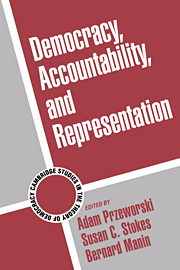Book contents
- Frontmatter
- Contents
- List of Contributors
- Introduction
- Part One Elections, Accountability, and Representation
- 1 Elections and Representation
- 2 Electoral Accountability and the Control of Politicians: Selecting Good Types versus Sanctioning Poor Performance
- 3 What Do Policy Switches Tell Us about Democracy?
- 4 Accountability and Authority: Toward a Theory of Political Accountability
- 5 Accountability and Manipulation
- 6 Party Government and Responsiveness
- 7 Democracy, Elections, and Accountability for Economic Outcomes
- Part Two The Structure of Government and Accountability
- Part Three Overview
- Author Index
- Subject Index
5 - Accountability and Manipulation
Published online by Cambridge University Press: 05 June 2012
- Frontmatter
- Contents
- List of Contributors
- Introduction
- Part One Elections, Accountability, and Representation
- 1 Elections and Representation
- 2 Electoral Accountability and the Control of Politicians: Selecting Good Types versus Sanctioning Poor Performance
- 3 What Do Policy Switches Tell Us about Democracy?
- 4 Accountability and Authority: Toward a Theory of Political Accountability
- 5 Accountability and Manipulation
- 6 Party Government and Responsiveness
- 7 Democracy, Elections, and Accountability for Economic Outcomes
- Part Two The Structure of Government and Accountability
- Part Three Overview
- Author Index
- Subject Index
Summary
The main point of this chapter is to discuss some of the ways politicians try to survive in office and to increase their margin of maneuverability to design and implement policies. I assume that, in addition to policy preferences, politicians want to win elections, stay in power, and maximize their autonomy in case their policies diverge from voters' preferences. I also assume that manipulative strategies consist of attempts by politicians to avoid the cost of such divergence. My discussion attempts to link agency theory and Machiavellian politics in order to interpret some aspects of the control of politicians by citizens in a democracy. To provide illustrations of typical political strategies and their consequences, I also draw from evidence pertaining to recent Spanish politics, examining some conjunctures of the Socialist government from 1982 to 1996. This long period in office, most of it with an absolute Socialist majority in Parliament, was marked by four consecutive electoral victories as well as by the troubled waters of unpopular economic policies, high unemployment, a dramatic reversal of position over NATO, and a long string of financial scandals.
Democratic theory has traditionally considered that, although the interests of citizens and politicians may diverge, elections are the instrument whereby citizens can ensure that politicians will act on their behalf and carry out their policy preferences. As a consequence, as Dahl (1970: 1) put it, “a key characteristic of a democracy is the continuing responsiveness of the government to the preferences of its citizens.”
- Type
- Chapter
- Information
- Democracy, Accountability, and Representation , pp. 154 - 196Publisher: Cambridge University PressPrint publication year: 1999
- 25
- Cited by



